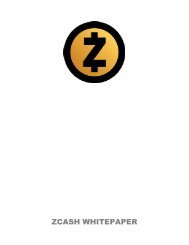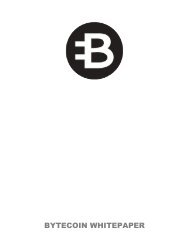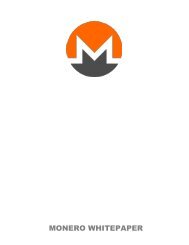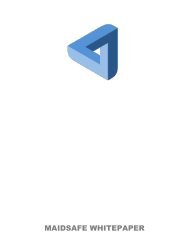Whitepaper - Ethereum Classic With Cover
Create successful ePaper yourself
Turn your PDF publications into a flip-book with our unique Google optimized e-Paper software.
<strong>Ethereum</strong> <strong>Classic</strong> Documentation, Release 0.1<br />
1.2.9 Parity<br />
Parity claims to be the world’s fastest and lightest <strong>Ethereum</strong> client. It is written in the Rust language, which offers<br />
improved reliability, performance, and code clarity. Parity is being developed by Ethcore, which was founded by<br />
several members of the <strong>Ethereum</strong> Foundation.<br />
• Website: https://ethcore.io/parity.html<br />
• Github: https://github.com/ethcore/parity<br />
• Gitter chat: https://gitter.im/ethcore/parity<br />
Arch Linux packages are community maintained by Afri Schoedon and quininer.<br />
• https://aur.archlinux.org/packages/parity/ (stable, latest release)<br />
• https://aur.archlinux.org/packages/parity-git/ (unstable, latest develop)<br />
Some people have reported success with Parity on Raspberry Pi 2.<br />
1.2.10 ruby-ethereum<br />
ruby-ethereum is an implementation of the <strong>Ethereum</strong> Virtual Machine written in Ruby.<br />
Links:<br />
• Github: https://github.com/janx/ruby-ethereum<br />
• Gem: https://rubygems.org/gems/ruby-ethereum<br />
Related:<br />
• ruby-serpent: Ruby binding to the <strong>Ethereum</strong> Serpent compiler.<br />
• ethereum-ruby: a pure-Ruby JSON-RPC wrapper for communicating with an <strong>Ethereum</strong> node. To use this<br />
library you will need to have a running <strong>Ethereum</strong> node with IPC support enabled (default). Currently, the<br />
go-ethereum client is supported.<br />
1.3 Account Management<br />
1.3.1 Accounts<br />
Accounts play a central role in <strong>Ethereum</strong>. There are two types of accounts: externally owned accounts (EOAs)<br />
and contract accounts. Here we focus on externally owned accounts, which will be referred to simply as accounts.<br />
Contract accounts will be referred to as contracts and are discussed in detail in Contracts. This generic notion<br />
of account subsuming both externally owned accounts and contracts is justified in that these entities are so called<br />
state objects. These entities have a state: accounts have balance and contracts have both balance and contract<br />
storage. The state of all accounts is the state of the <strong>Ethereum</strong> network which is updated with every block and<br />
which the network really needs to reach a consensus about. Account are essential for users to interact with the<br />
<strong>Ethereum</strong> blockchain via transactions.<br />
If we restrict <strong>Ethereum</strong> to only externally owned accounts and allow only transactions between them, we arrive at<br />
an “altcoin” system that is less powerful than bitcoin itself and can only be used to transfer ether.<br />
Accounts represent identities of external agents (e.g., human personas, mining nodes or automated agents). Accounts<br />
use public key cryptography to sign transaction so that the EVM can securely validate the identity of a<br />
transaction sender.<br />
44 Chapter 1. Contents
















